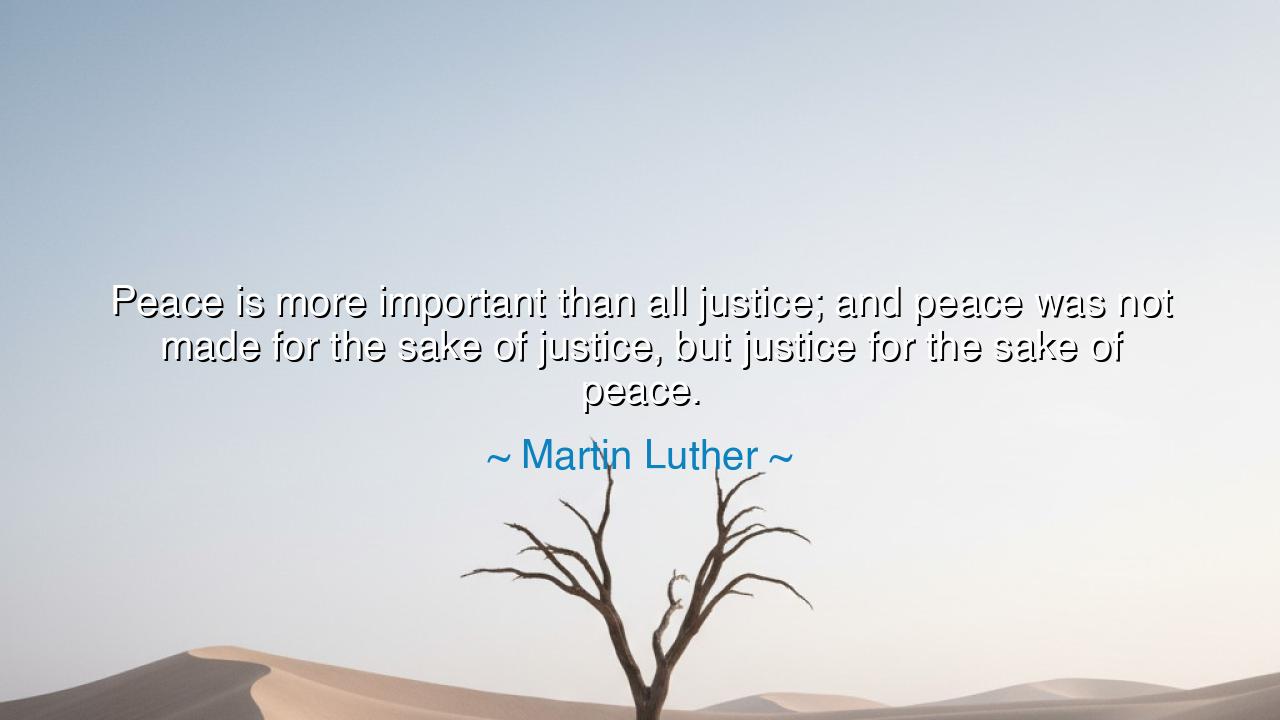
Peace is more important than all justice; and peace was not made
Peace is more important than all justice; and peace was not made for the sake of justice, but justice for the sake of peace.






Hear the solemn words of Martin Luther, the reformer who shook kingdoms and challenged empires: “Peace is more important than all justice; and peace was not made for the sake of justice, but justice for the sake of peace.” These words are no shallow utterance, but the cry of a man who saw the storms of conflict that follow righteous causes. They are a reminder that while justice is holy, its true purpose is not to exalt itself, but to establish peace among men. For justice without peace is a sword without a sheath—sharp, destructive, and without rest.
The origin of these words lies in Luther’s age, when Europe trembled beneath the weight of the Reformation. The old order of the Church was being challenged, kingdoms rose against kingdoms, and men burned for their beliefs. Luther himself, though bold in conviction, feared the rivers of blood that could—and did—flow from unchecked zeal. Thus he taught: let justice be sought, but always in service of peace, for the highest good is not the endless clash of right against right, but the harmony of human life under God’s will.
History gives us a clear reflection of his wisdom. Consider the long years of the Thirty Years’ War, born partly of religious struggle between Catholic and Protestant powers. Both sides claimed to fight for justice, each convinced of its righteousness. But what was the fruit? Cities burned, fields lay desolate, and millions perished. At last, exhausted, the warring nations turned to the Peace of Westphalia, realizing too late that the endless pursuit of justice through war had destroyed the very fabric of Europe. Here we see Luther’s warning fulfilled: justice that is not ordered toward peace becomes destruction.
Yet Luther does not dismiss justice. He calls it the servant of peace, the handmaiden to the higher good. For peace without justice is fragile, a shallow truce that may crumble at the first provocation. But justice for its own sake, pursued without regard for reconciliation, becomes tyranny, forcing men into endless struggle. The balance is delicate: peace must reign as the highest aim, and justice must bend itself to that purpose, ensuring that harmony is not a lie, but a living reality.
This truth is seen also in the life of Abraham Lincoln. In the midst of the American Civil War, Lincoln pursued justice—the end of slavery—but always with the greater vision of peace and union. His words, “with malice toward none, with charity for all,” revealed the same wisdom Luther spoke: justice that breeds only vengeance is empty, but justice that heals can restore a broken people. Peace was the end; justice was the path.
The lesson for us is clear. In our families, in our communities, in our nations, we must guard ourselves from the temptation of endless quarreling in the name of justice. Ask always: does this pursuit bring us closer to peace, or only deepen division? If our justice hardens into pride, it destroys the harmony it was meant to protect. But if our justice is tempered with humility and ordered toward reconciliation, then it fulfills its sacred purpose.
Therefore, remember Luther’s wisdom: peace is the crown, justice the servant. Do not despise justice, for it is the path by which peace is built. But do not worship it as an end in itself, lest it devour the very harmony it was made to protect. Seek peace in your dealings, in your judgments, in your words, and let your pursuit of justice always be measured by whether it brings rest to the soul and healing to the world. For the end of all striving, the fruit of all righteousness, is not strife but peace—that sacred stillness in which life flourishes and humanity may dwell together as one.
–––






HAHuy Anh
I see where Martin Luther is coming from, but this quote raises questions about the balance between peace and justice. Is it possible to have genuine peace without addressing the injustices that fuel conflict? If we allow justice to take a backseat for the sake of peace, do we risk letting future problems fester? It seems like a complex issue, especially in a world where both peace and justice are often elusive.
KHKiet Huynh
This quote seems to suggest that peace is the ultimate goal, even if it means sacrificing justice. But is peace truly meaningful if it’s built on injustice? Can we ever really achieve lasting peace if people feel that justice hasn’t been served? It feels like there’s an inherent tension between these two ideals, and I wonder which should take precedence in different situations.
KPVo Kim Khanh Phan
Martin Luther’s statement brings up a dilemma that I’ve often thought about. In situations where peace is achieved at the expense of justice, do we truly have peace, or is it just a temporary, fragile calm? Peace might be vital, but can we really have peace without justice eventually? What happens when justice is ignored in the name of maintaining peace for the moment?
HTHuy Trinh
I find this quote fascinating because it challenges the way we usually think about justice and peace. Most of the time, we see justice as a prerequisite for peace, but Martin Luther flips that idea. Does this mean that peace should be prioritized even if justice is compromised? Can peace exist without justice, or is this simply an idealistic view? It’s a tough question to answer, but it’s worth considering.